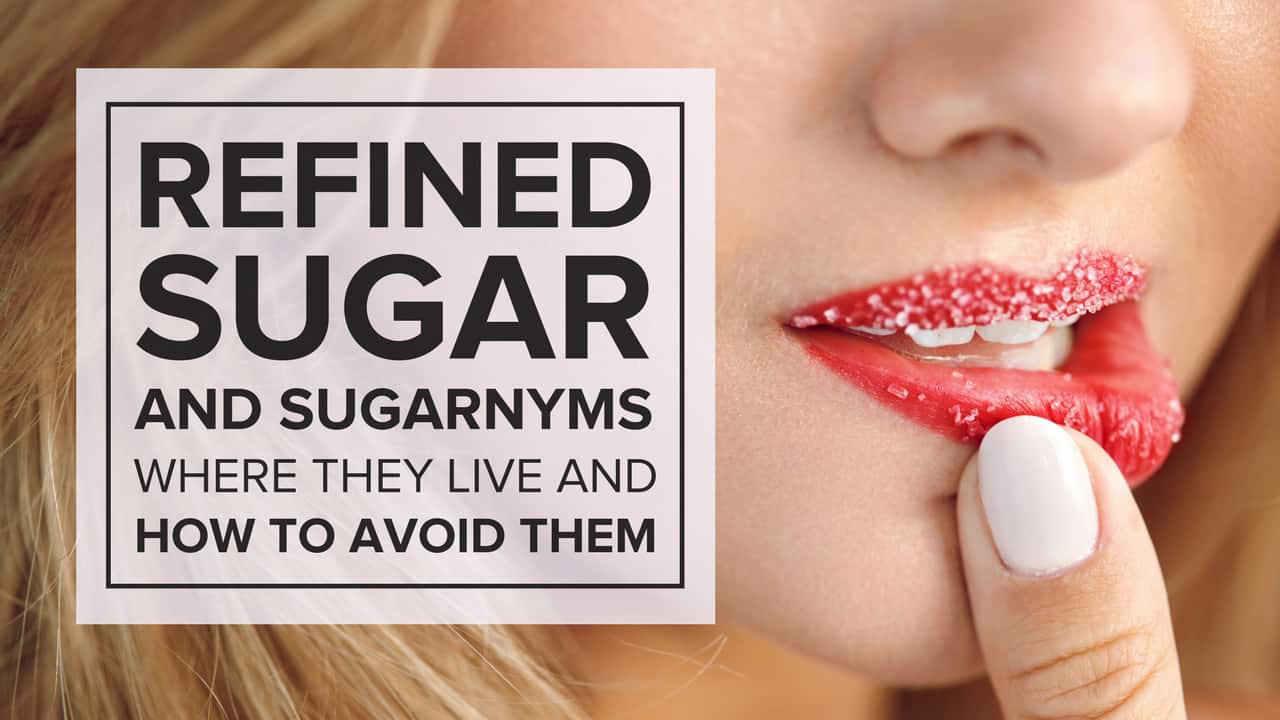
By now you’ve probably heard that refined sugar is bad for you. Practically everywhere you read, there’s a new article talking about the metabolic effects of refined sugar on causing insulin resistance, belly fat, your brain, and your child’s risk for developing attention deficit disorder (ADD).
However you slice it, there’s no two ways about it: refined sugar is detrimental to your metabolic health. The biochemical machine in which you live was not designed to process refined sugar.
Intellectually, most people would agree that refined sugar is inflammatory, yet many people still continue to consume it. One reason is that refined sugar is often present in a disguised form in many food products.
What is a "Sugarnym"?
Food manufacturers have become increasingly intelligent, and have now hidden refined sugars using names that consumers do not recognize. Even more deceivingly, food manufacturers promote these artificial sweeteners as being “healthy.” We call these disguised sugar synonyms Sugarnyms.
Sugarnyms are EVERYWHERE. They are in your kitchen cupboards. They are in your pantry. They are in your refrigerator. They are in your office desk.
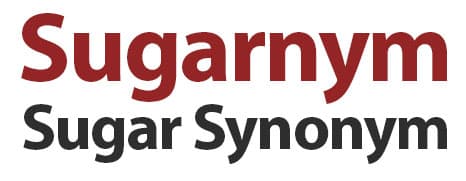
If you don’t read packages carefully, you’re likely to eat disguised refined sugar substitutes without knowing it.
Here we have compiled a list of almost 50 sugarnyms. These artificial sweeteners are everywhere in the grocery store, found mainly in packaged, bottled, and boxed products.
The sugarnyms listed below are found in many commonly eaten food products:
- Barley malt
- Beet sugar
- Brown rice syrup
- Brown sugar
- Buttered syrup
- Cane juice crystals
- Cane sugar
- Caramel
- Corn syrup
- Corn syrup solids
- Confectioner's sugar
- Carob syrup
- Castor sugar
- Date sugar
- Dextran
- Dextrose
- Diastatic malt
- Ethyl maltol
- Evaporated cane juice
- Evaporated fruit juice
- Fructose
- Galactose
- Glucose
- Glucose solids
- Golden sugar
- Golden syrup
- Grape sugar
- High fructose corn syrup
- Honey
- Icing sugar
- Invert sugar
- Lactose
- Maltodextrin
- Maltose
- Malt syrup
- Maple syrup
- Molasses
- Muscovado sugar
- Panocha
- Raw sugar
- Refiner's syrup
- Sorbitol
- Sorghum syrup
- Sucrose
- Sucralose
- Treacle
- Turbinado sugar
- Yellow sugar
A Harmless Trip to the Grocery Store
Just to prove how pervasive these refined sugar substitutes are, I took a quick trip to the grocery store and found selected a number of products that I routinely see in the kitchens and fridges of friends, family, and members of our coaching program (BEFORE they perform the “pantry raid” exercise).
Don’t be fooled by the words “organic” or “natural.” Food manufacturers use these words to entice you into purchasing their products, even though the real culprit is the refined sugar substitute.
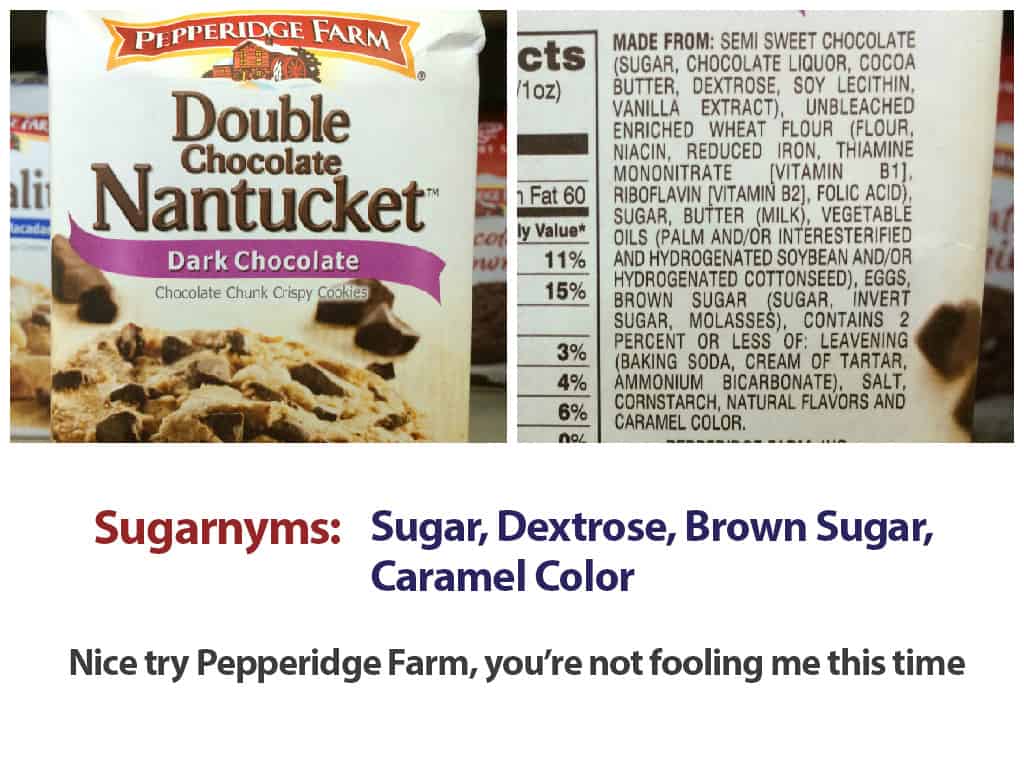
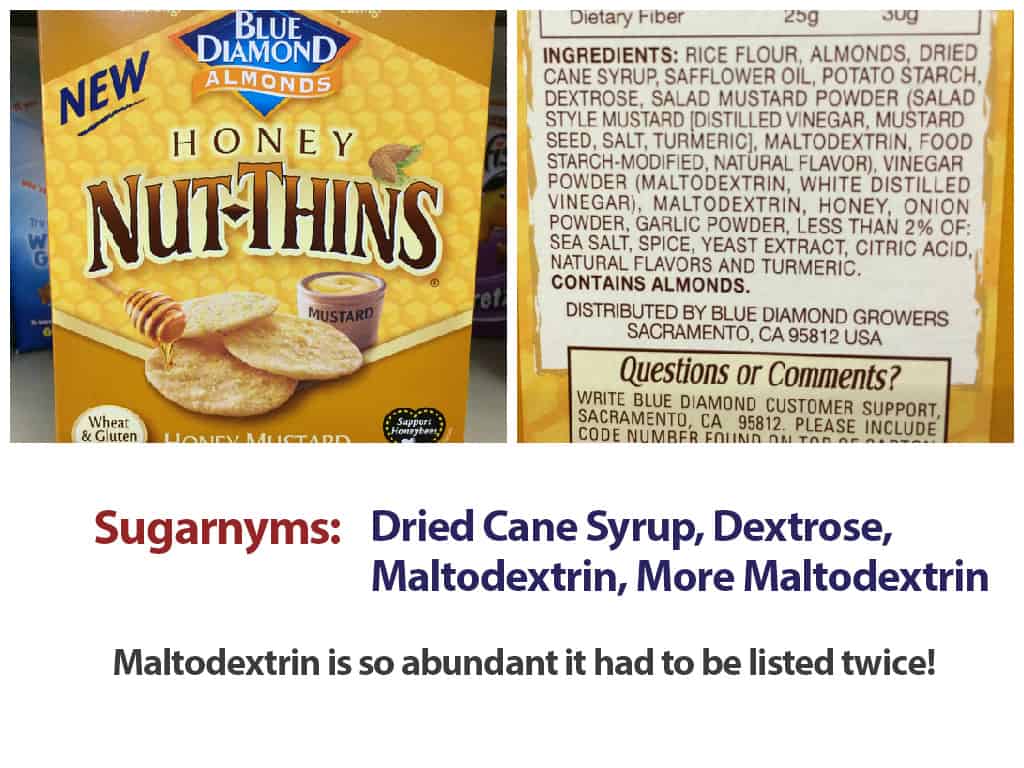
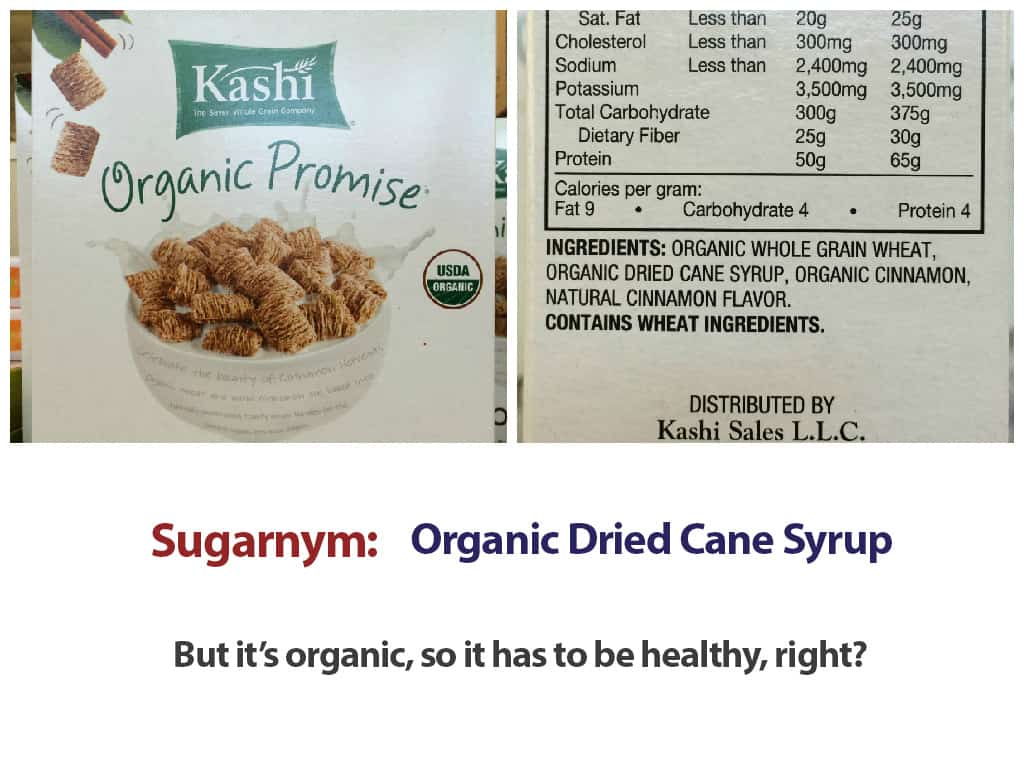
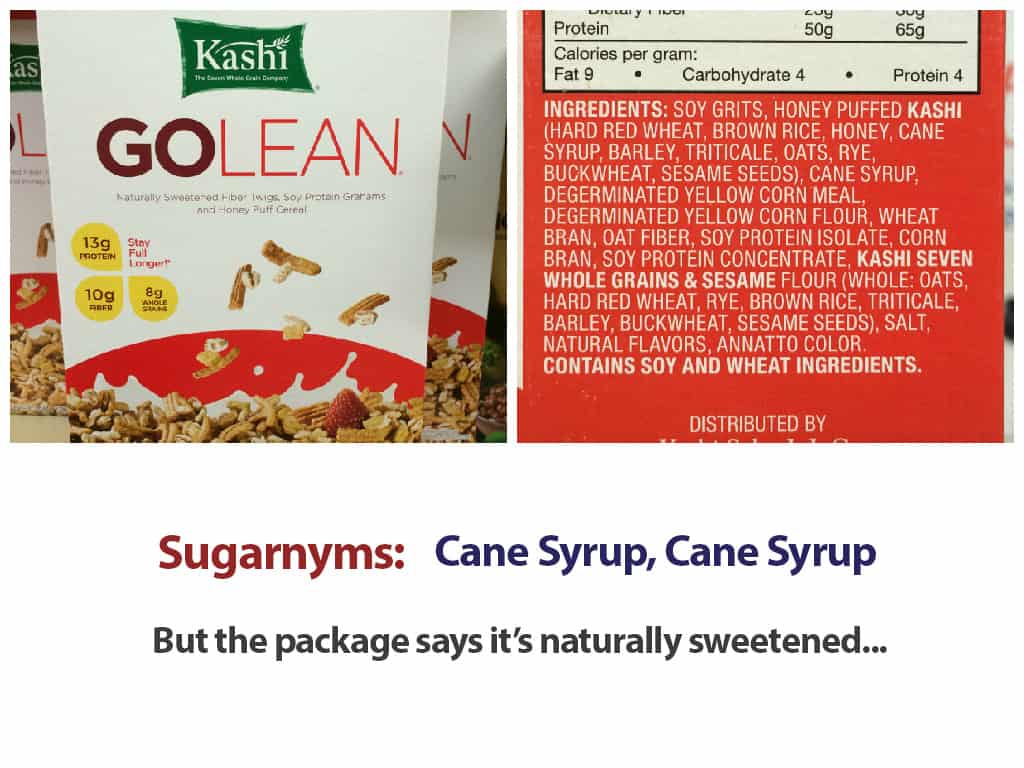

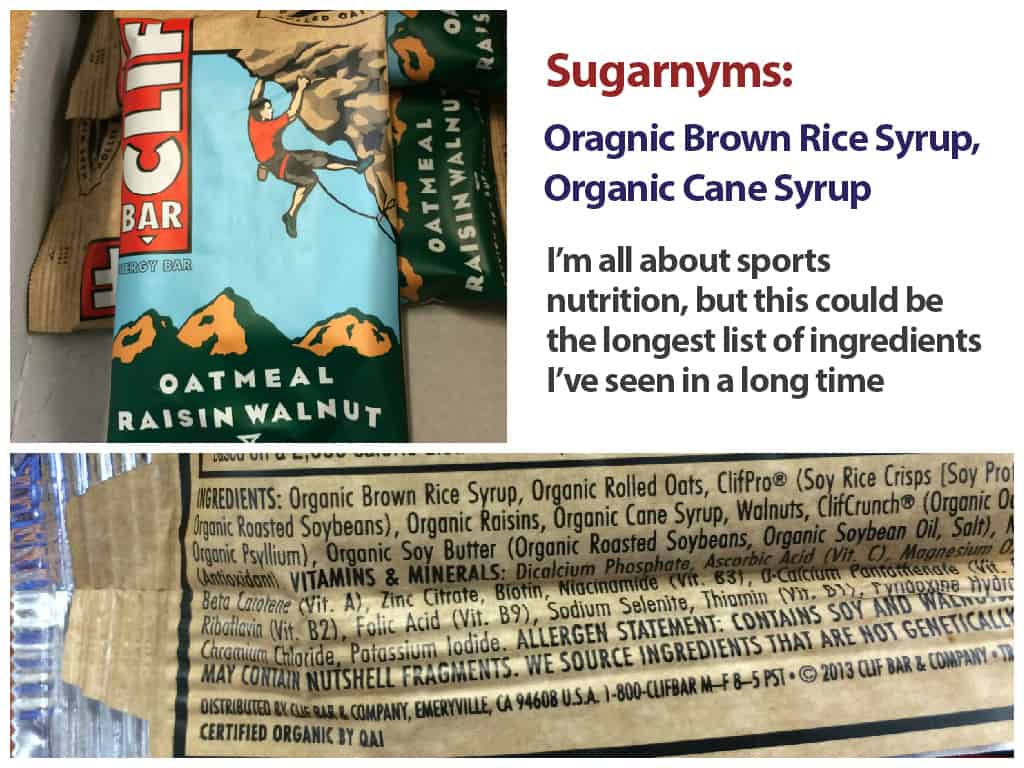
As you can see, the number of ingredients listed on the back of each package is large, and these packages often contain multiple sugarnyms from the list above.
If you don’t take the time to actually read the package carefully, you might wonder why your blood glucose is hard to control or why you feel subconsciously “addicted” to certain foods.
What If You Have a Sweet Tooth?
People often tell us that they have a sweet tooth and that they crave sweet foods especially at the end of the day. We often hear things like the following:
“If I don’t eat something sugary like chocolate, bad things happen. I get irritable, annoyed, or just plain upset.”
My response? Congratulations, you have a sugar addiction. And this is no joke. Sugar addiction is real. Very real.
Scientific experiments have shown that refined sugar can trigger the same neurological pathways in your brain as narcotic drugs, leading to a powerful addiction that can not only dominate your relationship with food, but sacrifice your metabolic health at the same time.
A Crash Course in Brain Biochemistry
If you are hungry for sweet flavors at the end of the day, it usually means that your intake of whole carbohydrate was too low earlier in the day.
The truth is, your brain is not asking for refined sugar – it is asking for whole carbohydrate energy.
Whole carbohydrate-rich foods like fruits, vegetables, lentils, and intact whole grains are metabolized into a wide variety of monosaccharide molecules, of which glucose is the most abundant.
Since your brain is designed to oxidize glucose for energy, eating whole carbohydrate-rich foods is your fast-track to recovering from a refined sugar addiction.
Make no mistake about it, your brain runs on glucose for 99% of your waking life. That’s why it’s important to eat whole carbohydrate-rich foods throughout the day (especially in the morning hours) in order to provide your brain with the energy that it requires for optimal cognition.
So if you have a sweet tooth that causes trouble at the end of the day, then be sure to consume easily digestible, readily available whole carbohydrate-rich foods throughout the day, and watch your sweet tooth disappear virtually overnight.
The ketogenic diet encourages you to eat a very low-carbohydrate, high-fat diet in order to run your brain and all tissues on ketone bodies, because ketone bodies are a "cleaner burning" fuel than glucose.
Unfortunately, this is faulty science at it's best. Those in the ketogenic world constantly point a finger at whole carbohydrates and refined sugar, failing to discriminate between the two, arguing that both of them will make you insulin resistant.
Please be aware that not only is this information incorrect, it is a clear lack of understanding of basic biochemistry, forcing your brain to adapt to an emergency backup fuel for extended periods of time.
We'll cover this in a future article, but for now take a look at the image below to give you an overview of the difference between the two brain fuel sources.

Refined Sugar Alternatives
So if you’re looking for alternatives to foods containing refined sugar, then what can you turn to in order to get the carbohydrate energy your brain needs? The foods below are excellent choices for readily available fast-acting carbohydrates:
Sugar Alternative #1: Medjool Dates
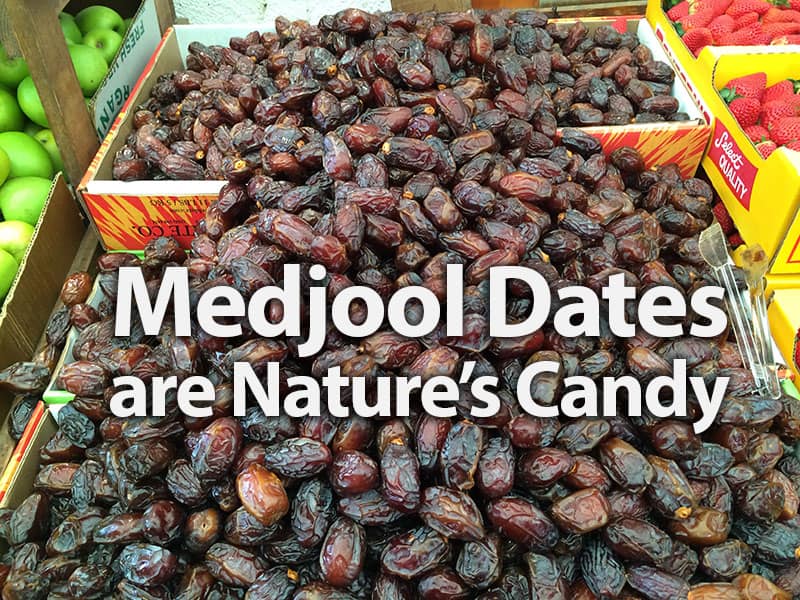
Medjool dates are nature’s candy. They are incredibly sweet packets of easily digestible whole carbohydrates. They’re so sweet in fact that only a couple of dates can satiate even the strongest sweet tooth.
The beauty of medjool dates is that they are incredibly nutritious, and have been a staple food in the Middle East for thousands of years. Visit any open air market in northern Africa or the Middle East and you will find vendors selling hundreds of date varieties.
Sugar Alternative #2: Organic Raisins
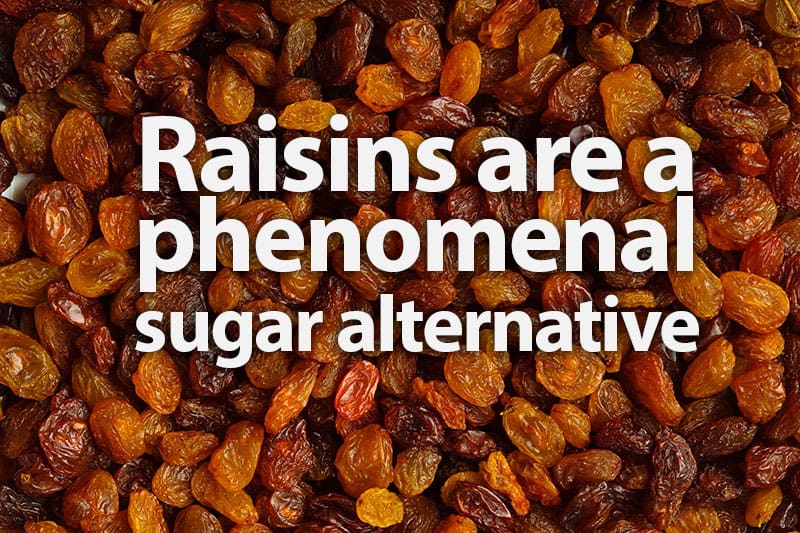
Raisins are another phenomenal alternative to sugar. Raisins are also quite sweet, and fulfill the criteria of “easily digestible readily available carbohydrate.”
Be sure to buy these organic, because grapes tend to be treated with a large collection of pesticides during growth, and are often found on the dirty dozen list of the most contaminated fruits and vegetables.
Take Home Message
The next time you are in the grocery store, take a moment to think twice before blindly choosing a package with exceptional marketing. Reducing your intake of refined sugar and sugarnyms can have a profound, positive impact on your ability to concentrate, exercise, and sleep.
Yes, it takes some effort, but I can assure you that eliminating even a mild sugar addiction is one of the best things you can do for your body. Period. End of story.
Lower Your A1c and Get to Your Ideal Body Weight ... Guaranteed
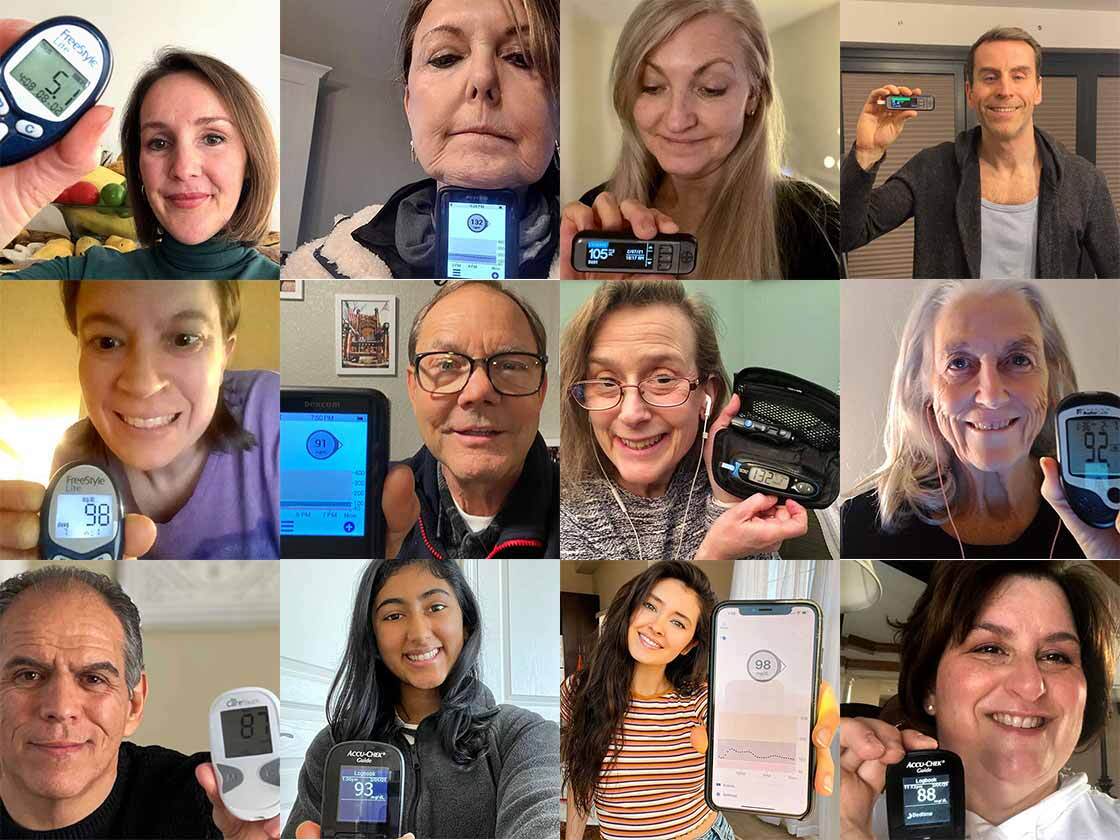
Your results are guaranteed. Join more than 10,000 ecstatic members today
Personalized coaching puts you in immediate control of your diabetes health, helps you gain energy, improves your quality of life, and reduces or eliminates your meds.
References
Leave a Comment!
Check your cabinets. What sugarnyms do you find lurking in your favorite packaged products?

